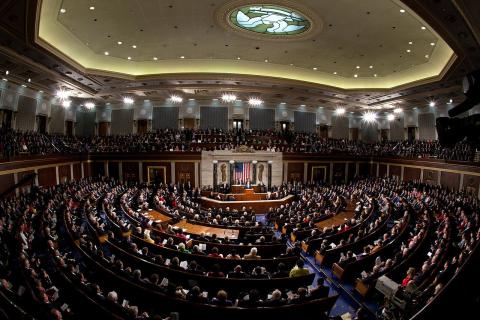Editor's Note: This article was originally published in 2013, but IVN feels it maintains a certain relevance today following the recent chemical attack in Syria and President Trump's subsequent airstrike.
As the United States prepares for action in the Syrian civil war, several Republicans have called for President Barack Obama to come to Congress and specifically ask for authorization to use military force. In response to this, President Obama spoke at the White House on Saturday.
Outside of an immediate threat, should any president be allowed to authorize an act of war without Congressional approval?
Yes | No | Undecided
In his speech, the president announced he would be asking for congressional authorization for war and intervention. Despite this, the president also said, "I believe I have the authority to carry out this military action without specific congressional authorization."
A key question in this debate is whether the president will act to intervene even if congressional war authorization is rejected since he says he already possesses the authority to do so. Obama's statement comes after the British Parliament rejected Prime Minister David Cameron's similar request for authorization.
Strictly speaking, the US has only declared war in five conflicts: War of 1812, Mexican War, Spanish-American War, World War I, and World War II. Many more times than not, Washington has committed and engaged in acts of war with separate authorizations from Congress or with no authorization at all. This goes for early American conflicts from the Quasi War of the John Adams administration and the Barbary Pirates as well as more contemporary conflicts in Afghanistan, Iraq, and Libya.
Debate exists whether congressional authorization for war is equivalent to a formal declaration of war. Is it war if acts of war, such as aerial bombing, take place? Is it war if American troops are put on the line?
The Constitution seems clear on the matter. Article 1, Section 8 describes the powers of the legislature and it includes the power to "declare war, grant letters of marque and reprisal, and makes rule concerning captures on land and water."
The War of 1812 was the country's first officially declared war. It was in this conflict that President James Madison, the principal author of the Constitution, went to Congress to ask for a formal declaration of war. This did not mark the first time the US was faced with a hostile force, but it was the first time the country was faced with a full-on war.
In 1950, President Harry Truman set the precedent of declining to go to Congress when he committed American troops to the Korean War. In that instance, the president said he was acting under the authority of the United Nations charter. Truman also used the term "police action" to justify his decision.
American involvement in the Vietnam War was instigated by the so-called Gulf of Tonkin incident. A resolution of the same name granted President Lyndon Johnson authority to escalate the American presence in southeast Asia.
Yet more recently, presidents have begun assuming war powers for themselves without going to the Congress. However, congressional votes that have taken place have tended to function as mechanisms for obtaining political support for the intended military action.
In the late 1990s, President Bill Clinton provided US air power in the ongoing Balkan civil war. The Republican Congress explicitly voted against any sort of authorization and Clinton still continued American involvement.
In the days after the September 11, 2001 terrorist attacks, Congress passed the Authorization for Use of Military Force Against Terrorists (AUMF). A separate war vote to intervene in Iraq was held in fall 2002. However, as the vice president during the Bush administration, Dick Cheney contended in his memoir that the president does not need congressional approval for military action. Recalling his time as secretary of defense during the Gulf War, Cheney objected to President George H. W. Bush going to Congress for authorization and wrote that "it would set a dangerous precedent":
"As a legal and constitutional matter, the president had the authority he needed. If he sought congressional approval, that would surely be read by some as a message that he needed the congressional vote. It looked to me like a move that would diminish the power of the office." (In My Time, hardcover edition, 208)
The most recent example of acting, or claiming to act without congressional approval, comes from the forty-fourth president himself. During the 2011 Libyan civil war, Obama committed American air power to the rebels fighting strongman Moammar el-Qaddafi. This was done under the auspices of support from the Arab League, the UN, and the War Powers Act. However, there was no authorization from the US Congress.
A 1973 law passed to rein in the war making powers of the president, the War Powers Act states that a president cannot commit the US without congressional war authorization for more than 60 days. By June 2011, when American involvement in Libya had reached nearly three months, White House Press Secretary Jay Carney infamously said that the administration had not violated the War Powers Act.
There is no word yet when congressional debate may occur. The only certainty is that some type of debate will occur. What is unclear is whether Congress will grant Obama the authority to intervene and whether Obama will intervene anyway if Congress rejects this call.
American history is full of examples of presidents going to Congress, declining to go to Congress, and ignoring Congress altogether. Public opinion is generally against involvement in Syria, so the White House and the president's strongest political allies are also likely to make a big push to get the support of the American people prior to any intervention in Syria.
Image Source: Wikimedia
